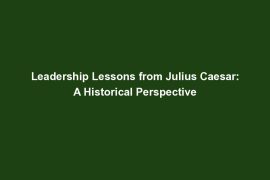Hey there fellow history buffs! Today, we’re going to delve into the fascinating world of leadership lessons from one of history’s greatest rulers – Augustus Caesar. If you’re a fan of Game of Thrones or The Crown, then you are going to love this exploration into the leadership style of a man who transformed the Roman Republic into a mighty Empire.
So, who was Augustus Caesar? Well, he was more than just Julius Caesar’s adopted heir. Augustus was a visionary leader who meticulously planned and executed military campaigns and administrative reforms that shaped the future of Rome. He was a master at building strong teams, surrounding himself with competent advisors and allies who shared his vision. And let’s not forget about his effective communication skills – using propaganda and public relations to maintain support among the masses.
But why should we care about studying historical leaders like Augustus Caesar? Well, because there are valuable lessons to be learned from their successes and failures that can be applied to modern leadership practices. By dissecting Augustus’ reign, we can extract key insights that can be translated into actionable strategies for leaders in today’s world.
So, grab a cup of coffee, settle in, and let’s uncover the leadership secrets of Augustus Caesar together. Get ready to be inspired and learn how you can apply these ancient lessons to your own leadership journey. Exciting stuff, right? Let’s jump in and explore the fascinating world of Augustus Caesar’s leadership legacy!
Vision and Strategic Planning
Let’s start by diving into one of the key leadership lessons we can learn from Augustus Caesar – vision and strategic planning. Augustus had a grand vision for transforming the Roman Republic into a powerful Empire. He didn’t just dream big; he meticulously planned and executed military campaigns and administrative reforms to achieve his goals.
Think of it like planning a road trip. You wouldn’t just hop in your car and start driving aimlessly, right? You’d plot out your route, set milestones, and anticipate roadblocks along the way. Augustus did the same thing with his leadership – he had a clear vision of where he wanted to take Rome and carefully mapped out the steps to get there.
Building a Strong Team
Another valuable lesson we can learn from Augustus is the importance of building a strong team. Augustus surrounded himself with competent advisors and allies who could help him achieve his vision. He didn’t try to do everything on his own; he delegated tasks to those who were best suited for the job.
Imagine trying to build a house without a team of skilled workers. It would be nearly impossible to do everything yourself. Augustus understood the power of collaboration and trust within his inner circle, fostering loyalty and support that was instrumental to his success.
Effective Communication
Lastly, let’s talk about effective communication. Augustus was a master at utilizing propaganda and public relations to maintain support of the masses. He knew how to cultivate a strong public image through speeches and public appearances, shaping the narrative to his advantage.
Communication is like a two-way street; it’s not just about talking, but also about listening and understanding your audience. Augustus knew how to connect with the people he led, gaining their trust and loyalty through effective messaging and engagement.
By studying Augustus Caesar’s leadership lessons in vision and strategic planning, building a strong team, and effective communication, we can apply these principles to modern leadership practices. Establishing a clear vision, nurturing a culture of collaboration and trust, and leveraging communication tools for maximum impact are just a few ways we can channel the spirit of Augustus in our own leadership journey. Stay tuned for the next section where we’ll dive deeper into how we can apply these lessons in today’s corporate landscape!
Applying Augustus Caesar’s Leadership Lessons to Modern Leadership
Now that we’ve delved into the fascinating leadership lessons we can glean from Augustus Caesar’s reign, let’s explore how we can apply these principles to our modern leadership practices. Just as Augustus demonstrated visionary thinking, effective team building, and strategic communication, there are valuable takeaways that can benefit leaders in the present day.
Establishing a clear vision and goals for the organization
One of the key aspects of Augustus’s success was his unwavering vision for transforming the Roman Republic into a powerful Empire. As modern leaders, it’s crucial to set clear goals and direction for our organizations. By outlining a compelling vision and communicating it effectively to our team, we can inspire them to work towards a common purpose and achieve remarkable results.
Building a strong team and nurturing a culture of collaboration and trust
Augustus surrounded himself with capable advisors and allies who supported his vision and contributed to the success of his reign. In today’s fast-paced business environment, teamwork and collaboration are more important than ever. By fostering a culture of trust and collaboration, leaders can empower their team members to work together towards shared goals, maximizing their collective potential.
Communicating effectively with stakeholders and leveraging communication tools for maximum impact
Just as Augustus understood the power of effective communication through propaganda and public relations, modern leaders must prioritize clear and open communication with their stakeholders. By utilizing a variety of communication tools and channels, leaders can ensure that their message reaches the right audience at the right time, driving engagement and alignment towards organizational objectives.
In conclusion, Augustus Caesar’s enduring legacy as a model for effective leadership serves as a timeless inspiration for leaders across generations. By embracing his visionary thinking, team-building strategies, and communication tactics, modern leaders can navigate the complexities of today’s business landscape with confidence and success.



